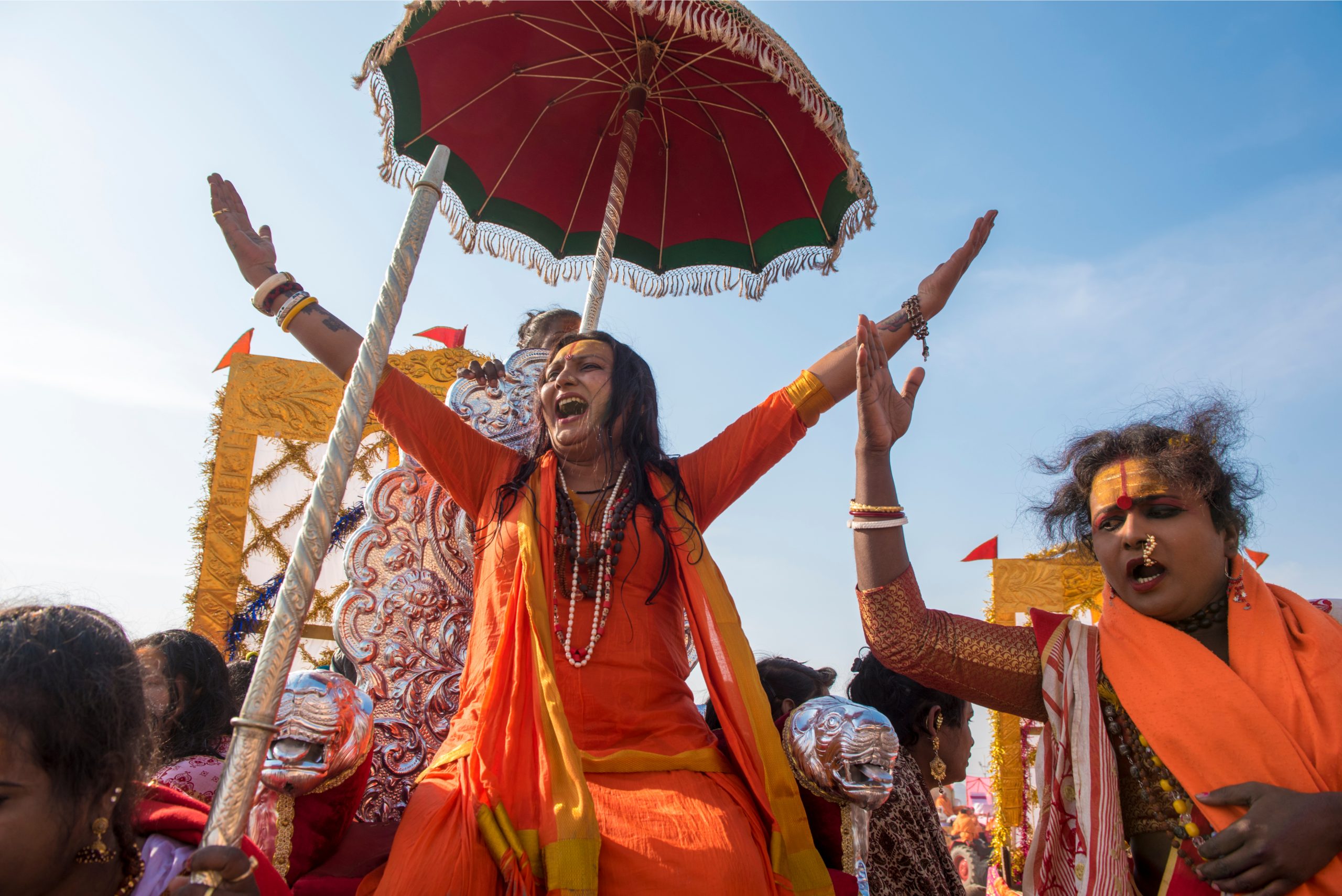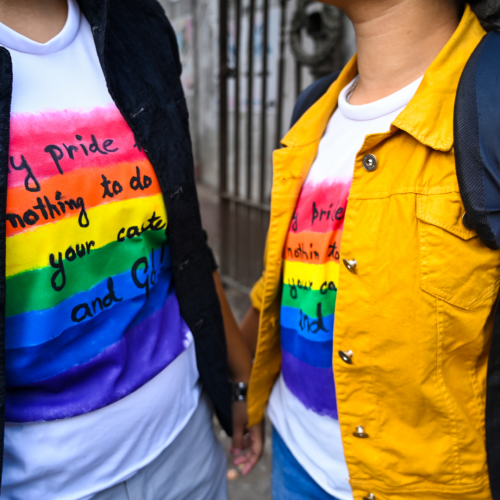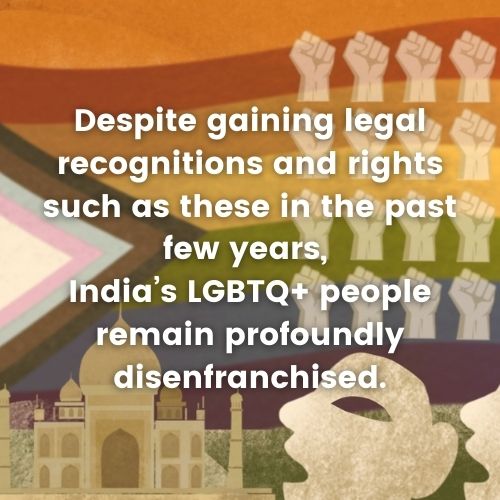Nineteen years old and a college student in Mumbai, Sara John should have been having the time of her life. But as part of India’s LGBTQ+ community, John had been experiencing the exact opposite, and things only got more complicated when COVID-19 hit and the country went on lockdown.
“I live with my parents to save on rent, which I couldn’t afford to pay otherwise, and I used to keep myself busy with university, generally staying outside the house in the day,” John says. “Since the lockdown began last year, I have had no place to go to escape my parents’ taunts, which have gotten worse.”
She says that she often is subject to lengthy, unavoidable lectures, which only make her feel more trapped. “I am almost at a breaking point now,” says John. “I have to face this the entire day.”
Fortunately, John has found an escape in social media, where other members of the LGBTQ+ community, along with their supporters and friends, have set up safe, breathing spaces for themselves. Indeed, even as its members are put under increasing pressure from different directions during the pandemic, the LGBTQ+ community is finding ways not only to cope with mounting hardships, but also to fight back and protect its members’ rights.
India is often thought of being tolerant of the LGBTQ+ partly because of the seeming acceptance of hijras, a non-binary gender identity in South Asia that includes trans and intersex people or transwomen. Yet it has been only three years since homosexuality was decriminalized in India, and less than two since a controversial TransBill was passed. And despite gaining legal recognitions and rights such as these in the past few years, India’s LGBTQ+ people remain profoundly disenfranchised.

A hijra sending blessings to their followers. The hijras, a non-binary gender identity in South Asia. They are traditionally worshipped in Hindu mythology, and are sought at births and weddings, among others, for their blessings. But many of them live on the fringes of society as they continue to suffer the same injustices as the rest of the LGBTQ+ community.
In fact, according to a 2019 report by International Commission of Jurists, the discrimination faced by LGBTQ+ people in this South Asian country “affects their ability to fully enjoy their civil, cultural, economic, political, and social rights,” and that this is even more severe in the case of trans and intersex people.
Safe and helpful online spaces
Unsurprisingly, the arrival of COVID-19 and the measures taken by the government to combat it has only made their situation even more difficult. But as John has discovered, India’s LGBTQ+ people are making their presence known in social media and elsewhere online – and providing support to one another, from offering simple listening ears to practical tips, to legal advice.
Informative pages that share resources, tips on daily survival, and even the occasional pop culture memes have seen spikes in activity as the pandemic wears on, as have virtual events, such as yesweexistindia on Instagram,. The likes of LGBTQIA+ India on Facebook, which has nearly 13,000 members, have also become popular virtual hangout spaces.

In truth, social media groups, which have always been gathering spaces for LGBTQ+ folks in India, have become even more important for those who are now facing increased trauma from their loved ones’ homophobia while on lockdown at home.
John, who came out to her parents as lesbian when she was 16, says she has been shamed, belittled, as well as pressured into seeking “professional help” for her “problems.”
“It started with the typical dismissal of ‘it’s just a phase’,” she recalls. “But the discussions regarding my sexuality intensified, and some relatives have suggested a form of conversion therapy — I’m afraid I will soon be pressured into that.”
These days, John says, she is going online more often. She says that she usually prefers a more passive role in following conversations and keeping up with arguments of others, which she says provides validation to many of her struggles.
“I’m constantly in touch with queer friends, some of whom I only know virtually,” John says. “They provide me much needed strength and space to express my emotions. I have also found some social media groups, which are my new haunts.”
Legal aid and health service access
Beyond the social media groups and pages that have helped in creative safe spaces for expression, as well as provide easily digestible and accessible information, there are also organizations like One Future Collective that have set up more structured, yet accessible forms of healing spaces.
Although the Collective’s initiatives are not exclusive to the LGBTQ+ community, the group provides legal aid and mental health support for those who need further help over matters such as gender-based violence, through the FemJustice Legal Aid Center and Helpline. Some organizations, meanwhile, have curated a list of queer-friendly health and legal services. These include Varta Trust, which has set up the Varta Online Locator for those seeking such help.

Varta Trust has also used publications, events, and workshops to bring focus and understanding about gender and sexuality. After all, as Pawan Dhal, a queer activist, researcher, and writer, notes, there has been an absence — even in non-COVID times — of coordinated public sector frameworks to ensure upliftment for LGBTQ+ people.
A founding trustee for Varta Trust, Dhal adds, “While there are a handful of government schemes that exist targeting trans people, for example, when I undertook an in-depth research, ground reality showed how these failed.”
Take access to health care, which remains a major challenge to Indians in general, especially those from marginalized backgrounds. LGBTQ+ individuals, especially trans persons, have had to face a unique set of issues, now exacerbated by the shrinking access to medical services. Not being able to avail of hormone therapy, for example, has led to a dire condition for many in the community.
Then there is the matter of employment which, in the age of COVID-19, has become a widespread problem. India’s economy has shrunk over 7.3% since the pandemic began last year, according to official figures, and there are fears of mass unemployment that would leave thousands without work forever. For many within the LGBTQ+ community, that actually looks more like a probability, as they had already faced hurdles to finding suitable employment and keeping jobs even before the current health crisis.
Short-term solutions, long-term dreams
Dhal admits that in the face of a pandemic, prioritizing LGBTQ+ community’s multiple concerns has been challenging, and that there are no easy answers for all the questions that pop up. He points out, “The pandemic has resulted in so many layers of problems with us — whether it is as an organization working for queer rights or queer individuals themselves. For us, as an organization, most of our funds have had to be directed toward relief work. Our workshop models have had to change.”
Nevertheless, Varta Trust is among the organizations that are setting up economic initiatives. The group’s Economic Inclusion Mentoring Forum for Queer Communities was set up only last year, when the pandemic was already underway. Now, says Dhal, “after discussions and basic preparation, we are working on connecting individuals with an opportunity in their field of interest.”
The project is still in its nascent stages, and Dhal says that the biggest challenge so far has been in finding sensitized trainers. In the meantime, he says that short-term solutions have been gaining traction, with groups like Solidarity Foundation holding crowdfunding efforts for sex workers and the LGBTQ+ community, along with several other fundraising and relief efforts.
The LGBTQ+ community remains unfazed as well regarding its myriad of concerns, among them the legal battle for marriage equality, which has been strongly opposed by the Modi administration. But while India’s LGBTQ+ people know they will have to tread a long road before they gain full inclusion and respect, the grassroots levels work by and for the community makes them optimistic that will happen one day. ●
Mehk Chakraborty is a freelance multimedia journalist and researcher who covers social movements, human rights, LGBTQ+ culture, travel, and the arts. She has an MA in Political Analysis, and her work has appeared on the BBC, The Daily Beast, Roads & Kingdoms, Waging Nonviolence, The Blueprint, and several other international publications.



















